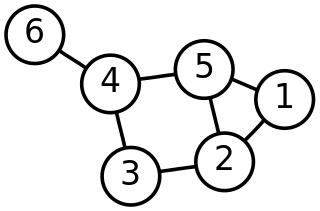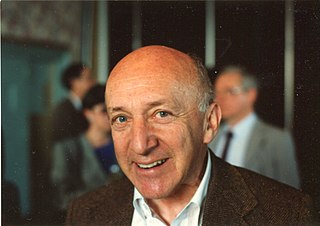Related Research Articles

Discrete mathematics is the study of mathematical structures that can be considered "discrete" rather than "continuous". Objects studied in discrete mathematics include integers, graphs, and statements in logic. By contrast, discrete mathematics excludes topics in "continuous mathematics" such as real numbers, calculus or Euclidean geometry. Discrete objects can often be enumerated by integers; more formally, discrete mathematics has been characterized as the branch of mathematics dealing with countable sets. However, there is no exact definition of the term "discrete mathematics".
Mathematics is an area of knowledge that includes the topics of numbers, formulas and related structures, shapes and the spaces in which they are contained, and quantities and their changes. These topics are represented in modern mathematics with the major subdisciplines of number theory, algebra, geometry, and analysis, respectively. There is no general consensus among mathematicians about a common definition for their academic discipline.
Mathematical logic is the study of formal logic within mathematics. Major subareas include model theory, proof theory, set theory, and recursion theory. Research in mathematical logic commonly addresses the mathematical properties of formal systems of logic such as their expressive or deductive power. However, it can also include uses of logic to characterize correct mathematical reasoning or to establish foundations of mathematics.

Leon Albert Henkin was an American logician, whose works played a strong role in the development of logic, particularly in the theory of types. He was an active scholar at the University of California, Berkeley, where he made great contributions as a researcher, teacher, as well as in administrative positions. At this university he directed, together with Alfred Tarski, the Group in Logic and the Methodology of Science, from which many important logicians and philosophers emerged. He had a strong sense of social commitment and was a passionate defensor of his pacifist and progressive ideas. He took part in many social projects aimed at teaching mathematics, as well as projects aimed at supporting women's and minority groups to pursue careers in mathematics and related fields. A lover of dance and literature, he appreciated life in all its facets: art, culture, science and, above all, the warmth of human relations. He is remembered by his students for his great kindness, as well as for his academic and teaching excellence.
Proof by exhaustion, also known as proof by cases, proof by case analysis, complete induction or the brute force method, is a method of mathematical proof in which the statement to be proved is split into a finite number of cases or sets of equivalent cases, and where each type of case is checked to see if the proposition in question holds. This is a method of direct proof. A proof by exhaustion typically contains two stages:
- A proof that the set of cases is exhaustive; i.e., that each instance of the statement to be proved matches the conditions of one of the cases.
- A proof of each of the cases.
In mathematical logic, propositional logic and predicate logic, a well-formed formula, abbreviated WFF or wff, often simply formula, is a finite sequence of symbols from a given alphabet that is part of a formal language. A formal language can be identified with the set of formulas in the language.
Alan Victor Oppenheim is a professor of engineering at MIT's Department of Electrical Engineering and Computer Science. He is also a principal investigator in MIT's Research Laboratory of Electronics (RLE), at the Digital Signal Processing Group.
Frederic Brenton Fitch was an American logician, a Sterling Professor at Yale University.

David Gries is an American computer scientist at Cornell University, United States mainly known for his books The Science of Programming (1981) and A Logical Approach to Discrete Math.

Harry Roy Lewis is an American computer scientist, mathematician, and university administrator known for his research in computational logic, textbooks in theoretical computer science, and writings on computing, higher education, and technology. He is Gordon McKay Research Professor of Computer Science at Harvard University, and was Dean of Harvard College from 1995 to 2003.
Carol Lee Walker is a retired American mathematician and mathematics textbook author. Walker's early mathematical research, in the 1960s and 1970s, concerned the theory of abelian groups. In the 1990s, her interests shifted to fuzzy logic and fuzzy control systems.
Elliott Mendelson was an American logician. He was a professor of mathematics at Queens College of the City University of New York, and the Graduate Center, CUNY. He was Jr. Fellow, Society of Fellows, Harvard University, 1956–58.

Louise Hay was a French-born American mathematician. Her work focused on recursively enumerable sets and computational complexity theory, which was influential with both Soviet and US mathematicians in the 1970s. When she was appointed head of the mathematics department at the University of Illinois at Chicago, she was the only woman to head a math department at a major research university in her era.
Deborah J. Hughes Hallett is a mathematician who works as a professor of mathematics at the University of Arizona. Her expertise is in the undergraduate teaching of mathematics. She has also taught as Professor of the Practice in the Teaching of Mathematics at Harvard University, and continues to hold an affiliation with Harvard as Adjunct Professor of Public Policy in the John F. Kennedy School of Government.
Cathy Kessel is a U.S. researcher in mathematics education and consultant, past-president of Association for Women in Mathematics, winner of the Association for Women in Mathematics Louise Hay Award, and a blogger on Mathematics and Education. She served as an editor for Illustrative Mathematics from the end of 2015 through July 15, 2017.

Katalin L. Vesztergombi is a Hungarian mathematician known for her contributions to graph theory and discrete geometry. A student of Vera T. Sós and a co-author of Paul Erdős, she is an emeritus associate professor at Eötvös Loránd University and a member of the Hungarian Academy of Sciences.
Patricia D. Shure is an American mathematics educator. With Morton Brown and B. Alan Taylor, she is known for developing "Michigan calculus", a style of teaching calculus and combining cooperative real-world problem solving by the students with an instructional focus on conceptual understanding. She is a senior lecturer emerita of mathematics at the University of Michigan, where she taught from 1982 until her retirement in 2006.
Bonnie Gold is an American mathematician, mathematical logician, philosopher of mathematics, and mathematics educator. She is a professor emerita of mathematics at Monmouth University.
Christina Eubanks-Turner is a professor of mathematics in the Seaver College of Science and Engineering at Loyola Marymount University (LMU). Her academic areas of interest include graph theory, commutative algebra, mathematics education, and mathematical sciences diversification. She is also the Director of the Master's Program in Teaching Mathematics at LMU.
Vilma María Mesa Narváez is a Colombian-American mathematics educator whose research topics have included secondary-school curriculum development, college-level calculus instruction, mathematics in community colleges, international perspectives in mathematics education, and inquiry-based learning. She is a professor of education and mathematics at the University of Michigan, where she is affiliated with the Center for the Study of Higher and Post-secondary Education.
References
- ↑ "Prizes and Awards at the Joint Mathematics Meetings in Atlanta. Mathematical Association of America". www.maa.org.
- ↑ Birth year from German national library catalogue data, retrieved 2018-11-27.
- ↑ Susanna S. Epp at the Mathematics Genealogy Project
- 1 2 Fifteenth Annual Louise Hay Award Citation: Susanna S. Epp , retrieved 2015-08-29
- ↑ Discrete Mathematics with Applications, 3rd Ed. Author: Susanna Epp , retrieved 2016-04-04
- ↑ Epp, Susanna S. (2011). Discrete mathematics with applications (4th ed.). Boston, MA: Brooks/Cole. ISBN 978-0-495-39132-6. OCLC 496962601.